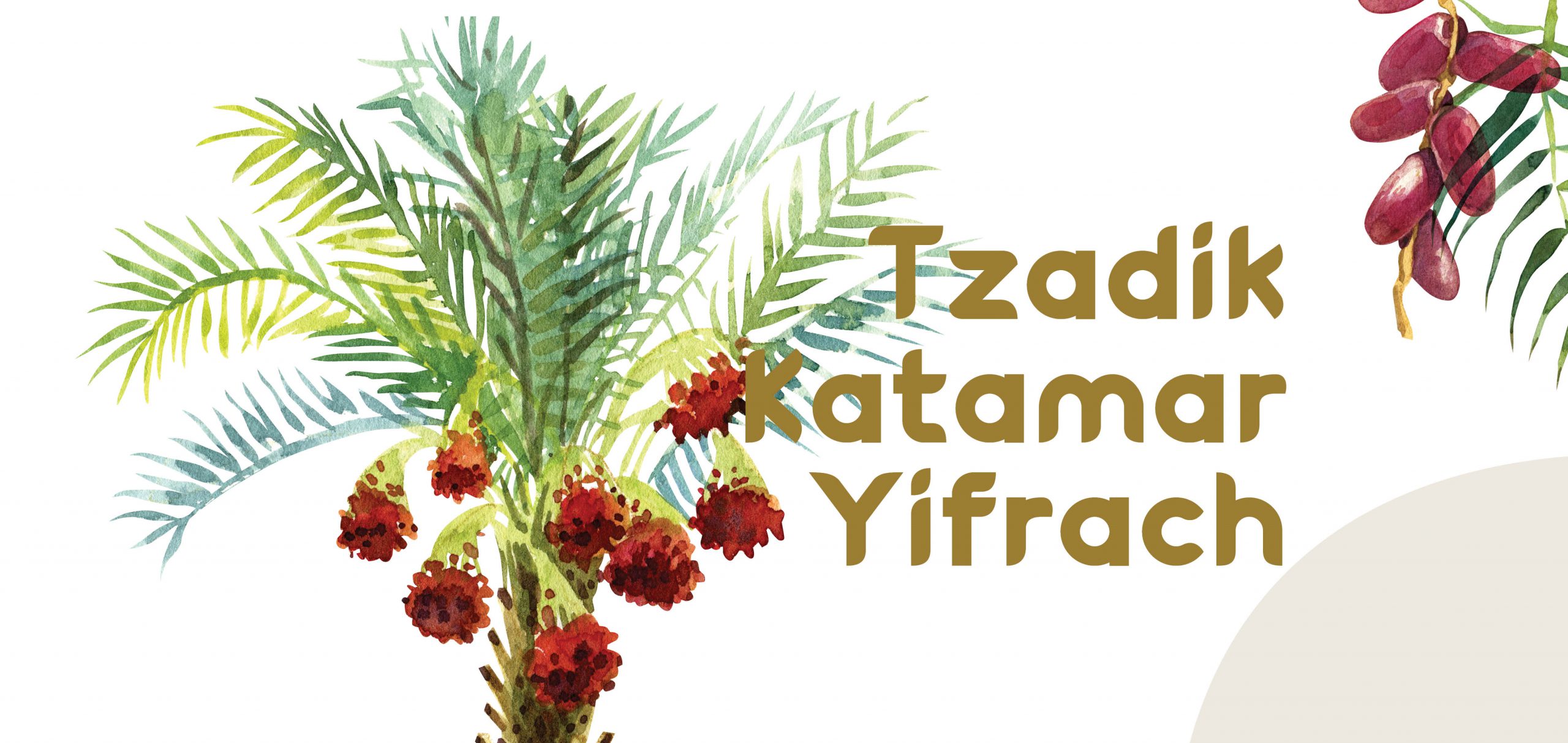Dates, a sweet and delicious fruit, feature prominently in the Torah and continue to be an important part of our holiday minhagim, especially on
Rosh Hashanah. Chazal say that anytime honey is mentioned in the Torah it refers to date honey. Date honey (also known as date syrup or silan) is listed as one of the seven special species that the Torah attributes to Eretz Yisroel.
Moreover, the Torah, on numerous occasions, praises Eretz Yisroel as a land
flowing with milk and honey. The Talmud (Kesubos 10b) credits dates with several significant health and nutritional benefits: they are fulfilling and satisfying, cleanse the body, prevent anxiety and worry, and heal various physical illnesses.
Dates are one of the simanim at the Rosh Hashanah table and it is the custom of many communities to prepare food where date syrup/silan is a key ingredient. The date palm tree is a symbol of righteousness (Psalm 92) and the Jewish nation as a whole are compared to a date tree in the Song of Songs (7:7). The Medrash (Bereishis 41) enumerates seven special qualities and characteristics that are found both in palm trees and in the people of the Jewish nation. It is interesting to note that a date tree in Yiddish is a “Teitelbaum”. This is the family name of many prominent Jewish families, including that of the famous Chassidic dynasty of Sighet-Satmar (my wife is a branch of that holy tree), and that of the great, sweet, and unforgettable Senior Rabbinic Coordinator at the OK, Rabbi Leizer Teitelbaum, z”l.
In the past, people thought that they were able to determine the kashrus status of a product by looking at the product or by examining the ingredient panel. It is now more commonly known that the ingredient panel is not the full story (even if the ingredients are understood and assuming there are no unintentionally omitted ingredients). Many ingredients are hidden in general terms like “natural flavors” and many products contain additives and processing aids that are not required by law to be declared on the ingredient panel. This includes citric acid as a pH adjuster, stearates as anti-caking, anti-foam oils as release agents, enzymes to break down juices, collagen as filtering aid, glycerin coatings as anti-clumping, and more. Additionally, even a perfectly kosher product can become not-kosher if the product (or any of its ingredients) was processed on non-kosher equipment or in a non-kosher environment1.
When a product proudly displays the OK symbol on the packaging, the customer can rest assured that the product is kosher without compromise. We ensure that dates and the various date related products bearing the OK symbol are all made with kosher ingredients and processing aids that meet our high kashrus standards and they are processed in kosher certified facilities on kosher equipment.
OK-certified date products are of the highest quality and our clients’ excellent quality control teams spare no effort to prevent infestation and remove defective products.
To conclude with a sweet vort. The Ponim Yofos explains the verse in Psalm 92: “A righteous person will flourish like a date palm, like a cedar in the Lebanon he will grow tall.” A date palm generally grows much shorter than other types of palm trees and cedar trees. This is because the date palm channels most of its energy into its offspring to produce healthy, nutritious and delicious fruit. Similarly, a righteous person devotes much of his time and energy to teach, guide and build up his children and students. One might think that the righteous person sacrifices and gives up from his own
personal growth and achievements; however, the opposite is true – they continue to grow tall and strong like the cedars of Lebanon because you never lose when you selflessly empower someone else to grow.
ביו”ד )סי’ ק”ג ס”ד( איתא דדבש של עכו”ם מותר ואין לחוש שהרתיחו בכלי 1
של איסור משום דבשר נותן טעם לפגם בדבש, והיינו אפי’ אם ידוע לנו שהכלי הי’
בן יומו דאי אינו ב”י בלאו האי טעמא הוי נטל”פ )עיי”ש בש”ך וביאור הגר”א(. ודנו
הפוסקים אמאי אין לחוש שהרתיחו הדבש בכלים שבישלו בהם שאר מיני איסורים
כגון דגים טמאים חלב עכו”ם יין וכדו’ וכתבו )עי’ היטיב פר”ח סי’ ק”ג, יד יהודה שם
סקכ”ב ודרכי תשובה שם סקס”ב וסקס”ד( דגם שאר איסורים נותנים טעם לפגם
בדבש עוד תי’ שלא היו רגילין לבשל שאר איסורים בכלים שמרתיחין דבש. ונפק”מ
בין התי’ באופן שידוע לנו שהרתיחו הדבש בכלי שבשלו בו שאר מיני איסורים דלטעם
הראשון עדיין מותר ולטעם השני אסור. לעניננו יש לדון אם דבש תמרים נכלל בדין
זה. דהנה בב”י סי’ קכ”ב וכס”מ פי”ז ממאכ”א הי”ח בתחילת דבריו השווה דבש
תמרים לסתם דבש לענין דין זה שכתב דהא דכוספן של גוי, שהוא פסולת של תמרים
שעושים ממנה שכר, מותר מהאי טעמא דדבש שהבשר נותן טעם לפגם בכוספן ואפי’
אם בשלו הכוספן בכלי בן יומו. אך בהמשך דבריו מביא מתשובות הרשב”א ומדייק
מדברי הרמב”ם )וכן מבואר מדברי רש”י ע”ז לח:( דבשר אינו נותן טעם לפגם בכוספן
ורק אם בשלו הכוספן בכלי שאינו ב”י הוי לפגם. ולא ברירא לי האם בחזרתו סובר
הב”י דכל דבש תמרים אין דינו כדבש סתמא ובכלי ב”י נותן טעם לשבח )דהא בתחילת דבריו חישב כוספן לדבש תמרים(, או דלמא במסקנא סובר הב”י דיש לחלק בין כוספן לדבש תמרים דדוקא לענין כוספן שנעשה מפסולת של תמרים וגם עושים ממנה שכר שהוא משקה מר ובזה י”ל שאין הבשר נוטל”פ )כעין הסברא בהא דעכבר דדברא דסי’ ק”ד דלא הוי נטל”פ בשכרא( ואז נמצא דדבש תמרים דעלמא גם למסקנת הב”י הוי נטל”פ בבשר ומותר בשל גוי. כל זה לפלפולא בעלמא שכמובן מוצר בהכשר האו קיי מעיד שנעשה בתכלית ההידור בלי להסמך על ביטולים ונותן טעם לפגם וכדו’. ועי’ אגרות משה יו”ד ח”ב סי’ מ”א.


 EN
EN  ZH
ZH  KR
KR  BR
BR  ES
ES  IN
IN  IL
IL 




